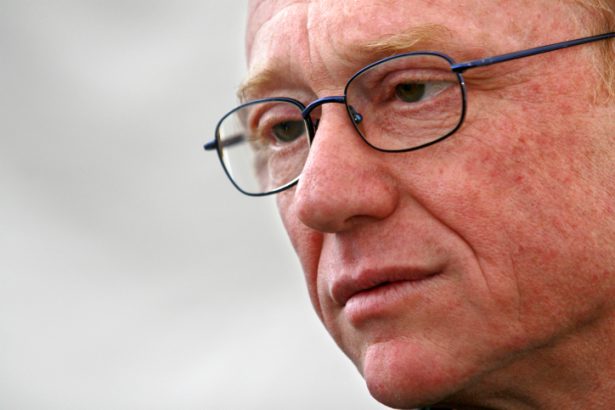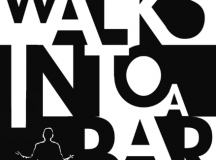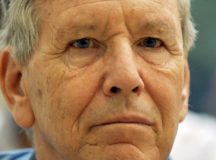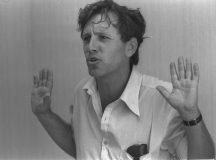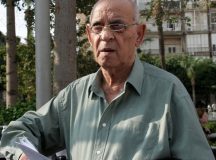Prizes have rained down on Israeli novelist David Grossman in recent years; the Israel Prize for literature in 2018 following on the heels of the International Man Booker in 2017 for the novella A Horse Walks Into a Bar. This essay by Liam Hoare shifts our gaze to Grossman’s journalism, from The Yellow Wind and Sleeping on a Wire to the less well known Lion’s Honey, recently reissued by Canongate. Hoare’s claim for Grossman’s non-fiction work is large indeed, that his ‘perceptiveness, compassion, keen eye and quiet rendering of seismic emotions in rich, lyrical, meandering prose has made Grossman, perhaps more than one of Israel’s great novelists, one of its foremost journalists’. Download a PDF version here.
1.
‘”Samson the hero” is what every Jewish child, the first time he or she hears the story, learns to call him,’ David Grossman writes in his masterful biblical treatise Lion’s Honey (2006) reissued by Canongate in 2018. Samson, who rent a young lion that ‘roared against him’ even though ‘he had nothing in his hand’. Samson, who slew a thousand men armed only with the ‘new jawbone of an ass’. Samson, who ‘took hold of the two middle pillars’ upon which a house host to Philistine lords was built, ‘bowed himself with all his might,’ and brought the house down ‘upon the lords,’ killing himself in the process in a murderous act of revenge.
This Samson is Samson ‘the brave leader,’ Samson ‘the Nazirite of God,’ Grossman says. But the Samson of Lion’s Honey — a close and compassionate reading of the Samson saga — is someone else entirely:
This is the story of a man whose life was a never-ending struggle to accommodate himself to the powerful destiny imposed upon him, a destiny he was never able to realise nor, apparently, fully to understand. It is the story of a child who was born a stranger to his father and mother; the story of a magnificent strongman who ceaselessly yearned to win his parents’ love — and, therefore, love in general — which in the end he never received.
Viewed through a novelist’s trained eye, Lion’s Honey takes the warrior and hero, the biblical myth, and makes him flesh, makes him human. Once read, the story of Samson cannot be understood in the same way again.
Take the episode with the lion itself. Some time after his daring act of self-defence, Samson returns to the vineyards of Timnath and discovers the carcass of the murdered lion, and inside it, a swarm of bees and honey. ‘And he took thereof in his hand, and went on eating, and came to his father and mother, and he gave them, and they did eat,’ it is written in the Book of Judges, ‘but he told not them that he had taken the honey out of the carcase of the lion’. In this scene, Grossman observes, as Samson ‘extends his hand without fear and scoops honey into his mouth … so simply, innocently, spontaneously,’ we discover his innocence in the ‘gulf between enormous physical strength and an immature, childlike soul’.
Grossman’s biblical analysis is a masterful act of deconstruction and demystification. Though we learn the name of Samson’s father, Manoah, his mother is referred to only as a ‘barren’ woman, visited by the angel of the Lord and told: ‘For, lo, thou shalt conceive, and bear a son; and no razor shall come on his head: for the child shall be a Nazarite unto God from the womb: and he shall begin to deliver Israel out of the hand of the Philistines.’ Samson’s mother here is stripped of agency, put-upon, scared and frightened, but in Lion’s Honey, Grossman brings out her complexities and idiosyncrasies, her shame and her joy, and urges that in order ‘to understand her, we need to go back and read the story through her eyes’.
Grossman is a tremendously perceptive and considerate novelist. Whether it is little Aaron’s arrested development and experiences of childhood in The Book of Intimate Grammar (1991) or the mother Ora’s grief and heartache — or fear of grief and heartache — in To the End of the Land (2008), Grossman’s talent, as with his readings of biblical figures, is his ability to undercover and convey the humanity of his characters. Even in something as superficially simple as peeling a potato, Grossman finds all of Ora’s fear, dread, and terror as she awaits word of her son, Ofer, who’s away with the Israel Defense Forces fighting a new war in the Galilee and supposed to come home that night:
What if they come in the middle of the potato? Ora thinks and stares at the large spud lying semi-peeled in her hand. Or in the middle of the onion. It gradually dawns on her that every movement she makes may be the last before the knock on the door. She reminds herself again that Ofer is unquestionably still at the Gilboa, and there’s no reason to panic yet, but the thoughts crawl up and wrap themselves around her hands as they clutch the peeler, and for an instant the knock on the door becomes so inevitable, such an intolerable provocation of the capacity for disaster embodied in every human condition, that her mind confuses cause with effect and the dull, slow movements of her hands around the potato seem like the essential prelude to the knock.
But this perceptiveness, this compassion, his keen eye and way he quietly renders seismic emotions in rich, lyrical, meandering prose is also what has made Grossman, perhaps more than one of Israel’s great novelists, one of its foremost journalists. Alongside totemic works of fiction like To the End of the Land and See Under: Love (1986), his books of journalism like The Yellow Wind (1987) and Sleeping on a Wire (1992) are enduring classics whose power is undimmed and observations undiminished by time and distance from the periods in which Grossman was writing. Not only explorations of Palestinian and Israeli Arab societies, these books showed, in a manner of speaking, how little Israelis truly knew about the other in their midst and of the causes of the conflagration that would, shortly after The Yellow Wind’s publication, engulf the land they shared.
2.
It was 1980 when Grossman first felt he had to write something about the occupation. ‘I could not understand how an entire nation like mine, an enlightened nation by all accounts, is able to train itself to live as a conqueror without making its own life wretched.’ The outcome of two years of work was his debut novel, The Smile of the Lamb (1983), but the more Grossman wrote, ‘the more I understood that the occupation is a continuing and stubborn test for both sides trapped in it. It is the sphinx lying at the entrance to each of us, demanding that we give a clear answer’.
Years would pass, however, before he returned to the subject of occupation again and it would take the form of The Yellow Wind, his journalistic masterpiece that, as the Israeli writer Tal Kra-Oz has noted, ‘eerily foresaw the intifada which was to erupt’ not long after its publication and made him ‘one of the most eloquent and outspoken figures on the Israeli left’. The book takes the form of a series of articles written for the Israeli weekly Koteret Rashit, which came out of a seven-week journey through the West Bank. ‘I wanted to go to the places which haunted me,’ Grossman explains. ‘Into the heart of the harsh clash between Jew and Arab. To see things with my own eyes in order to write about them.’
‘On a day of turbid rain, at the end of March, I turn off the main road leading from my house in Jerusalem to Hebron, and enter the Deheisha refugee camp.’ Here, Grossman’s journey into the West Bank, into the pinched, proscribed world of the Palestinians living under Israeli occupation, begins. Residents of the refugee camp tell Grossman of the villages and houses their forefathers abandoned, and when they do, it reminds him of the way his own grandmother spoke about Poland, from whence she was expelled. He described lives lived ‘double and split,’ with people trained ‘almost from birth’ to live at once in the refugee camp while their souls inhabit Jaffa and Haifa, the orchards, vineyards, and long-lost stone-built houses.
While to Israelis everything in the late 1980s may have seemed more-or-less well-managed, in the West Bank Grossman discovered the underlying conditions — the broken dreams and simmering, festering hatreds — that would shortly lead to intifada. ‘Of course I hate you. Maybe at the beginning I didn’t hate and only feared. Afterwards, I began to hate,’ A.N., a resident of Balata refugee camp who spent ten years in Israeli jails, would tell Grossman in Nablus. Fluent in Arabic, the way Grossman renders his conversations with Palestinians make the other in the conflict no longer an abstract but realised, existing people with sometimes stark and shocking views:
Before I went to jail, I didn’t even know I was a Palestinian. There they taught me who I am. Now I have opinions. Don’t believe the ones who tell you that the Palestinians don’t really hate you. Understand: the average Palestinian is not the fascist and hating type, but you and life under your occupation push him into hatred. Look at me, for example. You took ten years of my life from me. You exiled my father in ’68. He hadn’t done anything. He wasn’t even a PLO supporter. Maybe even the opposite … And my mothe r— for six years you did not allow her to go to visit him. And I — after prison, you don’t let me build a house, or leave her to visit Jordan, nothing … You made us into living dead. And me, what remains of me? Only the hatred of you and thoughts of politics.
While in Deheisha, Grossman visits an UNRWA-funded school. Though the old textbooks full of hate and anti-Israel propaganda have gone, ‘their content is now transmitted orally’. In the middle of a conversation he is having with one of the teachers, suddenly a little two-year-old boy gets up, holding a short yellow plastic stick, and mimics shooting at the author. ‘Why are you shooting me?’ he asks the child, who runs to his teacher and peeks out at Grossman from behind her arm, laughing. ‘Who do you want to shoot?’ the teachers ask the boy, smiling like two mothers taking pride in a smart child, Grossman observes. ‘Jews,’ says the boy.
So too did Grossman reveal the shabbiness of the occupation. On a visit to a military court in Nablus — an ‘ugly, dirty, dark building’ with broken, filthy windows that ‘as soon as I was inside I felt a need to contract, make myself small, to keep from touching other objects’ — he witnesses how the military regime maintains order in the West Bank, while at the time creating the next generation of stone-throwers and bomb-makers, for to go to prison is to learn what it means to be Palestinian. Inside, they receive what Grossman calls ‘a trimester course in national consciousness’. The military judicial system was to Grossman, too, one of the ways in which the occupation was corrupting the occupiers themselves.
Towards the end of his journey, the demonstrations and arrests, stone throwings and tire burnings — the very stuff of the First Intifada — were beginning to pick up in frequency and ‘violence waited above like a torch sputtering in the wind’. Three thousand security prisoners were in the midst of a hunger strike in the military jails, and on the road from the Alfei Menache to neighbouring Kfar Saba a Molotov cocktail was launched at an Israeli car and a pregnant mother, trapped inside, was killed. The Yellow Wind concludes in ominous tones. ‘The history of the world proves that the situation we preserve here cannot last for long,’ Grossman writes, ‘and if it lasts, it will exact a deadly price’. And he was right.
3.
The relationship between Israelis and Palestinians — how each looks at the other — dominates The Yellow Wind. But Grossman was especially interesting when delving into the subject of what the occupation was doing to Palestinian society itself. The Green Line split the village of Barta’a in the Wadi Ara in 1949: the western half falling inside Israel; the eastern half inside the Jordanian-controlled West Bank. The Israel occupation of the West Bank after 1967 in effect reunited Barta’a as both goods and labour could move back and forth across the Green Line.
‘The two halves, the two lovers, could finally make their unification a reality’ in 1967, Grossman describes, but ‘they descended into the ravine, looked at one another—and were strangers.’ The initial contact was awkward and unpleasant. Those who had lived in Israel for 19 years ‘were mode modern, more open and free,’ the mukhtar of Israeli Barta’a told Grossman. Those from Palestinian Barta’a ‘would lecture us haughtily, feeling that they were better Arabs than we were,’ more wedded to tradition and Islam. In but 20 years, the Palestinian Arabs thought the Israeli Arabs had become lazy, docile, emasculated, weak in their political thinking, while the Israelis considered the Palestinians backward.
The essential difference between the one Barta’a and the other was articulated by the mukhtar: ‘They’ — those of West Bank Barta’a — ‘really see themselves as part of the Palestinian people. We see ourselves as part of the Palestinian people, but also as an integral part of Israel.’ Those two communities had become two peoples — Israeli Arabs had, in less than 20 years, become a distinct group both inside Israel and the wider Palestinian community. Four years after the publication of The Yellow Wind, Grossman would set out on another journey, albeit this one a kind of internal voyage to discover this world within a world, the community within a community, of the Arabs or Palestinians living in Israel itself.
In researching Sleeping on a Wire Grossman would return to Barta’a. In 1987 he had tried to organise a meeting of the two halves of the village and failed, but four years later, he succeeded albeit with much reluctance on the part of the villagers. In conversation, Grossman discovered that main impact of the First Intifada on the Israelis in Barta’a was the burgeoning of a Palestinian national consciousness among them. ‘Before, if anyone asked me, I would say that I was, you know, an Israeli Arab,’ Rafat Kabha, a 29-year-old teacher, tells him. ‘Now I’m proud of being Palestinian, because it does not contradict my citizenship nor Israeli law.’
Still, the border remained in the minds of Barta’a’s residents, albeit now the tables had turned. Once the Israelis looked down upon the Palestinians, referring to them dismissively as dafawim, West Bankers. Now, emboldened by the First Intifada, one could ‘sense how a very slight timidity had suddenly settled over the Arabs from the Israeli side’ as the Palestinians swaggered into the meeting Grossman had organised. He wrote of the Palestinian ringleader of that meeting that ‘every gesture and expression of his exudes scorn and arrogance,’ while of the Israelis he observed, ‘When any of them made a “declaration” to me, it was clear from his expression that he realised how empty his voice sounded.’
As in Lion’s Honey, these observational human details, these close readings of character, applying novelistic tools to a journalistic situation, noting how, for example, the Israelis twitched in discomfort ‘with a trace of discerning reservation’ at being labelled ‘the “48”’ by the Palestinians, are woven throughout The Yellow Wind and Sleeping on a Wire. These notes are among the things that give his journalism both its foresightedness and its inherent humanity, not free from judgement necessarily but rippling with the conflict and turmoil that come with being an Israeli guest in Palestinian territory and society, standing before the full Palestinian narrative, being a witness to things one believed one knew but had never truly seen or heard before. The Yellow Wind and Sleeping on a Wire are testament to the inherent power and value not merely of meeting with and listening to the other but the possibility that, as a result of being challenged, one can produce something truly profound.

